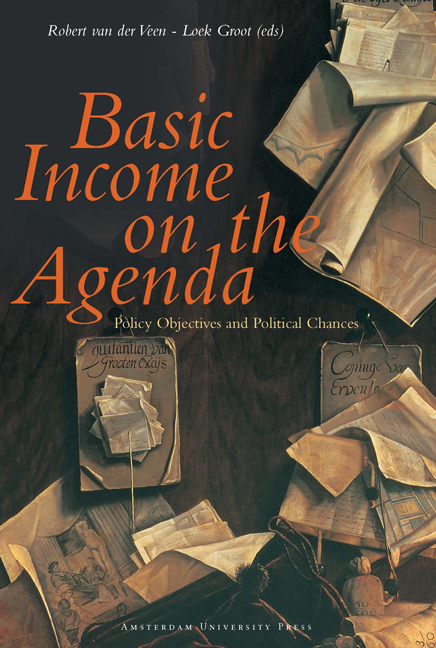Hush Money or Emancipation Fee? A Gender Analysis of Basic Income
Published online by Cambridge University Press: 23 January 2021
Summary
One of the major attractions of the basic income debate is its genuine interdisciplinary and multi-dimensional character. This diversity of the discussion is reflected in the publications on basic income. These include philosophical theories (e.g.Van Parijs, 1995), economic studies providing a theoretical analysis of implementation proposals and labour market effects (e.g. Atkinson, 1995), microsimulation models predicting labour market effects and testing budgetary feasibility (Atkinson, 1995; Gilain and Van Parijs, 1995; Nelissen and Polk, 1996) and socio-economic analyses studying a basic income in the context of welfare state reforms (e.g. Schokkaert, Van der Linden and Van Parijs, 1997;Van Parijs, 1990;Walter, 1989).
However, most of this research is gender blind in the sense that it does not tackle the question of whether a basic income would have different effects on men and women. Moreover, when gender aspects are occasionally discussed, the claims on the desirability of a basic income for women are quite contradictory.
Proponents of a basic income argue that unpaid work would get some recognition (Miller, 1986;Walter, 1989;Withorn, 1990), that the autonomy of poor women (McKay and VanEvery, 1995) or all women (Walter, 1989) would increase, that it would help to achieve greater gender equality in the labour market by improving women's bargaining position and by encouraging men to work part-time, thus allowing them to share more in domestic work (Standing, 1992) and that it would be possible to choose for unpaid labour (Miller, 1986;Walter, 1989). Jordan (1998: 93) argues that a basic income would be a compensation that does not confine women to their homes, but recognizes unpaid work as an essential element in the reproduction of the national social system. Additionally, it would offer some income to men and women willing to forego labourmarket opportunities in order to do it. Jordan evaluates a basic income for women very positively, and argues that a basic income will lead to a maximum of the population having basic autonomy so that they can participate on chosen terms in the household, the informal public sphere and the labour market (ibid.: 173, my italics). Jordan further believes that a basic income might ensure that a couple negotiates over paid and unpaid work roles from positions of relative autonomy (ibid.: 194.
- Type
- Chapter
- Information
- Basic Income on the AgendaPolicy Objectives and Political Chances, pp. 121 - 136Publisher: Amsterdam University PressPrint publication year: 2000
- 11
- Cited by



